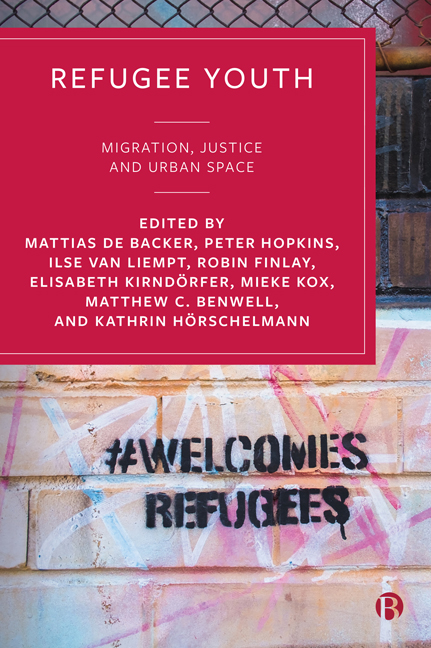Book contents
- Frontmatter
- Contents
- List of Figures and Tables
- Notes on Contributors
- Acknowledgements
- 1 Introducing Refugee Youth: Migration, Justice and Urban Space
- 2 Storying Belonging, Enacting Citizenship? (Dis)articulations of Belonging in a Community Theatre Project with Young Refugees and Asylum Seekers in Leipzig, Germany
- 3 Jackets and Jewellery: Racialised Dispossession and Struggles over Public Space in Denmark
- 4 Venezuelan Refugee Youth and Brazilian Schooling: The Individual between Languages and Spaces
- 5 The Inclusionary Potential and Spatial Boundaries of (Semi-)Public Space: Refugee Youth’s Everyday Experiences in the Urban Fabric of Amsterdam
- 6 Navigating ‘Purdah’ Culture in Urban Space: The Restricted Lives of Young Married Rohingya Refugees in Malaysia
- 7 Inclusive Urban Planning and Public Space for Refugee Youth in Pursuit of a Just City in Amman, Jordan
- 8 Sense of Belonging among Tibetan Refugees in India: A Case Study of the Bylakuppe Settlement in Karnataka, India
- 9 Negotiating Identity in Urban Space: Everyday Geographies of Syrian Students in Istanbul
- 10 ‘You’re Judged a Lot’: Australian Sudanese and South Sudanese Youths’ Perspectives on Their Experiences in Public Spaces
- 11 Hair Salons as ‘Private-Public Spaces’: Exploring the Experiences of Young Migrant Women in an Urban Township in South Africa
- 12 Emotion and Spatial Belonging: Exploring Young Migrant Men’s Emotional Geographies in Cork, Ireland
- 13 Homemaking through Music in Urban Africa: Creating Opportunities as a Refugee and a Migrant in Kinshasa and Dar es Salaam
- 14 Planetary Listening
- 15 Refugee Youth: Politics, Publicness and Visibility
- Index
13 - Homemaking through Music in Urban Africa: Creating Opportunities as a Refugee and a Migrant in Kinshasa and Dar es Salaam
Published online by Cambridge University Press: 18 January 2024
- Frontmatter
- Contents
- List of Figures and Tables
- Notes on Contributors
- Acknowledgements
- 1 Introducing Refugee Youth: Migration, Justice and Urban Space
- 2 Storying Belonging, Enacting Citizenship? (Dis)articulations of Belonging in a Community Theatre Project with Young Refugees and Asylum Seekers in Leipzig, Germany
- 3 Jackets and Jewellery: Racialised Dispossession and Struggles over Public Space in Denmark
- 4 Venezuelan Refugee Youth and Brazilian Schooling: The Individual between Languages and Spaces
- 5 The Inclusionary Potential and Spatial Boundaries of (Semi-)Public Space: Refugee Youth’s Everyday Experiences in the Urban Fabric of Amsterdam
- 6 Navigating ‘Purdah’ Culture in Urban Space: The Restricted Lives of Young Married Rohingya Refugees in Malaysia
- 7 Inclusive Urban Planning and Public Space for Refugee Youth in Pursuit of a Just City in Amman, Jordan
- 8 Sense of Belonging among Tibetan Refugees in India: A Case Study of the Bylakuppe Settlement in Karnataka, India
- 9 Negotiating Identity in Urban Space: Everyday Geographies of Syrian Students in Istanbul
- 10 ‘You’re Judged a Lot’: Australian Sudanese and South Sudanese Youths’ Perspectives on Their Experiences in Public Spaces
- 11 Hair Salons as ‘Private-Public Spaces’: Exploring the Experiences of Young Migrant Women in an Urban Township in South Africa
- 12 Emotion and Spatial Belonging: Exploring Young Migrant Men’s Emotional Geographies in Cork, Ireland
- 13 Homemaking through Music in Urban Africa: Creating Opportunities as a Refugee and a Migrant in Kinshasa and Dar es Salaam
- 14 Planetary Listening
- 15 Refugee Youth: Politics, Publicness and Visibility
- Index
Summary
Introduction
Esatis (25) is a self-taught and engaged slam poet. Nathan-2K (30) is a gospel music guitarist. Esatis and Nathan-2K are artist names. Esatis fled the Central African Republic (CAR) in the aftermath of the 2013 coup d’état that plunged his country into a period of uncertainty and found refuge in Kinshasa (Democratic Republic of the Congo). Nathan-2K grew up in war-torn Eastern Congo. In 2017 he moved to Dar es Salaam where he was offered a job in a church choir. The two artists do not know each other. Yet their life trajectories, which meet in this chapter, share similarities: both were born in the 1990s and grew up in a context of ‘neither war nor peace’ (Larmer et al, 2013); and both left their home city and made their way to an African megapolis.
Based on these two trajectories, the purpose of this chapter is threefold. First, by concentrating on trajectories within Africa, it problematises South– North migration narratives. Second, by placing the biographical trajectory of one ‘migrant’ next to that of one ‘refugee’, it questions the artificial migrant– refugee divide. Third, by focusing on personal success, rather than on vulnerability, the chapter challenges, or at least complements, images of the vulnerable refugee or migrant. The accent comes to lie on self-affirmation and dignity instead.
Even if the lives of two individuals cannot contain all the diversity and complexities of youth in Africa, a biographical approach, nevertheless, sheds light on the context of critical decision moments in these young men's life trajectories. It is by exploring these moments that a deeper understanding of how lives unfold in a constant interplay of structure and agency is brought to life. In this chapter, moreover, agency, as it shapes the personal geographies of Esatis and Nathan-2K, is understood through music. It is through music that both artists constructed a niche for themselves in Kinshasa and Dar es Salaam respectively, turning these two cities into their homes. Throughout, the chapter alludes to meaningful spaces to which Esatis and Nathan-2K contribute musically. Woven together, these spaces (which include music recording studios, cultural podia, university classrooms, churches and the digital sphere) constitute some of many layers in urban African soundscapes.
- Type
- Chapter
- Information
- Refugee YouthMigration, Justice and Urban Space, pp. 209 - 224Publisher: Bristol University PressPrint publication year: 2023



